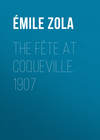Kitobni o'qish: «The Three Cities Trilogy: Paris, Volume 5»
BOOK V
I
THE GUILLOTINE
FOR some reason of his own Guillaume was bent upon witnessing the execution of Salvat. Pierre tried to dissuade him from doing so; and finding his efforts vain, became somewhat anxious. He accordingly resolved to spend the night at Montmartre, accompany his brother and watch over him. In former times, when engaged with Abbe Rose in charitable work in the Charonne district, he had learnt that the guillotine could be seen from the house where Mege, the Socialist deputy, resided at the corner of the Rue Merlin. He therefore offered himself as a guide. As the execution was to take place as soon as it should legally be daybreak, that is, about half-past four o'clock, the brothers did not go to bed but sat up in the workroom, feeling somewhat drowsy, and exchanging few words. Then as soon as two o'clock struck, they started off.
The night was beautifully serene and clear. The full moon, shining like a silver lamp in the cloudless, far-stretching heavens, threw a calm, dreamy light over the vague immensity of Paris, which was like some spell-bound city of sleep, so overcome by fatigue that not a murmur arose from it. It was as if beneath the soft radiance which spread over its roofs, its panting labour and its cries of suffering were lulled to repose until the dawn. Yet, in a far, out of the way district, dark work was even now progressing, a knife was being raised on high in order that a man might be killed.
Pierre and Guillaume paused in the Rue St. Eleuthere, and gazed at the vaporous, tremulous city spread out below then. And as they turned they perceived the basilica of the Sacred Heart, still domeless but already looking huge indeed in the moonbeams, whose clear white light accentuated its outlines and brought them into sharp relief against a mass of shadows. Under the pale nocturnal sky, the edifice showed like a colossal monster, symbolical of provocation and sovereign dominion. Never before had Guillaume found it so huge, never had it appeared to him to dominate Paris, even in the latter's hours of slumber, with such stubborn and overwhelming might.
This wounded him so keenly in the state of mind in which he found himself, that he could not help exclaiming: "Ah! they chose a good site for it, and how stupid it was to let them do so! I know of nothing more nonsensical; Paris crowned and dominated by that temple of idolatry! How impudent it is, what a buffet for the cause of reason after so many centuries of science, labour, and battle! And to think of it being reared over Paris, the one city in the world which ought never to have been soiled in this fashion! One can understand it at Lourdes and Rome; but not in Paris, in the very field of intelligence which has been so deeply ploughed, and whence the future is sprouting. It is a declaration of war, an insolent proclamation that they hope to conquer Paris also!"
Guillaume usually evinced all the tolerance of a savant, for whom religions are simply social phenomena. He even willingly admitted the grandeur or grace of certain Catholic legends. But Marie Alacoque's famous vision, which has given rise to the cult of the Sacred Heart, filled him with irritation and something like physical disgust. He suffered at the mere idea of Christ's open, bleeding breast, and the gigantic heart which the saint asserted she had seen beating in the depths of the wound – the huge heart in which Jesus placed the woman's little heart to restore it to her inflated and glowing with love. What base and loathsome materialism there was in all this! What a display of viscera, muscles and blood suggestive of a butcher's shop! And Guillaume was particularly disgusted with the engraving which depicted this horror, and which he found everywhere, crudely coloured with red and yellow and blue, like some badly executed anatomical plate.
Pierre on his side was also looking at the basilica as, white with moonlight, it rose out of the darkness like a gigantic fortress raised to crush and conquer the city slumbering beneath it. It had already brought him suffering during the last days when he had said mass in it and was struggling with his torments. "They call it the national votive offering," he now exclaimed. "But the nation's longing is for health and strength and restoration to its old position by work. That is a thing the Church does not understand. It argues that if France was stricken with defeat, it was because she deserved punishment. She was guilty, and so to-day she ought to repent. Repent of what? Of the Revolution, of a century of free examination and science, of the emancipation of her mind, of her initiatory and liberative labour in all parts of the world? That indeed is her real transgression; and it is as a punishment for all our labour, search for truth, increase of knowledge and march towards justice that they have reared that huge pile which Paris will see from all her streets, and will never be able to see without feeling derided and insulted in her labour and glory."
With a wave of his hand he pointed to the city, slumbering in the moonlight as beneath a sheet of silver, and then set off again with his brother, down the slopes, towards the black and deserted streets.
They did not meet a living soul until they reached the outer boulevard. Here, however, no matter what the hour may be, life continues with scarcely a pause. No sooner are the wine shops, music and dancing halls closed, than vice and want, cast into the street, there resume their nocturnal existence. Thus the brothers came upon all the homeless ones: low prostitutes seeking a pallet, vagabonds stretched on the benches under the trees, rogues who prowled hither and thither on the lookout for a good stroke. Encouraged by their accomplice – night, all the mire and woe of Paris had returned to the surface. The empty roadway now belonged to the breadless, homeless starvelings, those for whom there was no place in the sunlight, the vague, swarming, despairing herd which is only espied at night-time. Ah! what spectres of destitution, what apparitions of grief and fright there were! What a sob of agony passed by in Paris that morning, when as soon as the dawn should rise, a man – a pauper, a sufferer like the others – was to be guillotined!
As Guillaume and Pierre were about to descend the Rue des Martyrs, the former perceived an old man lying on a bench with his bare feet protruding from his gaping, filthy shoes. Guillaume pointed to him in silence. Then, a few steps farther on, Pierre in his turn pointed to a ragged girl, crouching, asleep with open month, in the corner of a doorway. There was no need for the brothers to express in words all the compassion and anger which stirred their hearts. At long intervals policemen, walking slowly two by two, shook the poor wretches and compelled them to rise and walk on and on. Occasionally, if they found them suspicious or refractory, they marched them off to the police-station. And then rancour and the contagion of imprisonment often transformed a mere vagabond into a thief or a murderer.
In the Rue des Martyrs and the Rue du Faubourg-Montmartre, the brothers found night-birds of another kind, women who slunk past them, close to the house-fronts, and men and hussies who belaboured one another with blows. Then, upon the grand boulevards, on the thresholds of lofty black houses, only one row of whose windows flared in the night, pale-faced individuals, who had just come down from their clubs, stood lighting cigars before going home. A lady with a ball wrap over her evening gown went by accompanied by a servant. A few cabs, moreover, still jogged up and down the roadway, while others, which had been waiting for hours, stood on their ranks in rows, with drivers and horses alike asleep. And as one boulevard after another was reached, the Boulevard Poissonniere, the Boulevard Bonne Nouvelle, the Boulevard St. Denis, and so forth, as far as the Place de la Republique, there came fresh want and misery, more forsaken and hungry ones, more and more of the human "waste" that is cast into the streets and the darkness. And on the other hand, an army of street-sweepers was now appearing to remove all the filth of the past four and twenty hours, in order that Paris, spruce already at sunrise, might not blush for having thrown up such a mass of dirt and loathsomeness in the course of a single day.
It was, however, more particularly after following the Boulevard Voltaire, and drawing near to the districts of La Roquette and Charonne, that the brothers felt they were returning to a sphere of labour where there was often lack of food, and where life was but so much pain. Pierre found himself at home here. In former days, accompanied by good Abbe Rose, visiting despairing ones, distributing alms, picking up children who had sunk to the gutter, he had a hundred times perambulated every one of those long, densely populated streets. And thus a frightful vision arose before his mind's eye; he recalled all the tragedies he had witnessed, all the shrieks he had heard, all the tears and bloodshed he had seen, all the fathers, mothers and children huddled together and dying of want, dirt and abandonment: that social hell in which he had ended by losing his last hopes, fleeing from it with a sob in the conviction that charity was a mere amusement for the rich, and absolutely futile as a remedy. It was this conviction which now returned to him as he again cast eyes upon that want and grief stricken district which seemed fated to everlasting destitution. That poor old man whom Abbe Rose had revived one night in yonder hovel, had he not since died of starvation? That little girl whom he had one morning brought in his arms to the refuge after her parents' death, was it not she whom he had just met, grown but fallen to the streets, and shrieking beneath the fist of a bully? Ah! how great was the number of the wretched! Their name was legion! There were those whom one could not save, those who were hourly born to a life of woe and want, even as one may be born infirm, and those, too, who from every side sank in the sea of human injustice, that ocean which has ever been the same for centuries past, and which though one may strive to drain it, still and for ever spreads. How heavy was the silence, how dense the darkness in those working-class streets where sleep seems to be the comrade of death! Yet hunger prowls, and misfortune sobs; vague spectral forms slink by, and then are lost to view in the depths of the night.
As Pierre and Guillaume went along they became mixed with dark groups of people, a whole flock of inquisitive folk, a promiscuous, passionate tramp, tramp towards the guillotine. It came from all Paris, urged on by brutish fever, a hankering for death and blood. In spite, however, of the dull noise which came from this dim crowd, the mean streets that were passed remained quite dark, not a light appeared at any of their windows; nor could one hear the breathing of the weary toilers stretched on their wretched pallets from which they would not rise before the morning twilight.
On seeing the jostling crowd which was already assembled on the Place Voltaire, Pierre understood that it would be impossible for him and his brother to ascend the Rue de la Roquette. Barriers, moreover, must certainly have been thrown across that street. In order therefore to reach the corner of the Rue Merlin, it occurred to him to take the Rue de la Folie Regnault, which winds round in the rear of the prison, farther on.
Here indeed they found solitude and darkness again.
The huge, massive prison with its great bare walls on which a moonray fell, looked like some pile of cold stones, dead for centuries past. At the end of the street they once more fell in with the crowd, a dim restless mass of beings, whose pale faces alone could be distinguished. The brothers had great difficulty in reaching the house in which Mege resided at the corner of the Rue Merlin. All the shutters of the fourth-floor flat occupied by the Socialist deputy were closed, though every other window was wide open and crowded with surging sightseers. Moreover, the wine shop down below and the first-floor room connected with it flared with gas, and were already crowded with noisy customers, waiting for the performance to begin.
"I hardly like to go and knock at Mege's door," said Pierre.
"No, no, you must not do so!" replied Guillaume.
"Let us go into the wine shop. We may perhaps be able to see something from the balcony."
The first-floor room was provided with a very large balcony, which women and gentlemen were already filling. The brothers nevertheless managed to reach it, and for a few minutes remained there, peering into the darkness before them. The sloping street grew broader between the two prisons, the "great" and the "little" Roquette, in such wise as to form a sort of square, which was shaded by four clumps of plane-trees, rising from the footways. The low buildings and scrubby trees, all poor and ugly of aspect, seemed almost to lie on a level with the ground, under a vast sky in which stars were appearing, as the moon gradually declined. And the square was quite empty save that on one spot yonder there seemed to be some little stir. Two rows of guards prevented the crowd from advancing, and even threw it back into the neighbouring streets. On the one hand, the only lofty houses were far away, at the point where the Rue St. Maur intersects the Rue de la Roquette; while, on the other, they stood at the corners of the Rue Merlin and the Rue de la Folie Regnault, so that it was almost impossible to distinguish anything of the execution even from the best placed windows. As for the inquisitive folk on the pavement they only saw the backs of the guards. Still this did not prevent a crush. The human tide flowed on from all sides with increasing clamour.
Guided by the remarks of some women who, leaning forward on the balcony, had been watching the square for a long time already, the brothers were at last able to perceive something. It was now half-past three, and the guillotine was nearly ready. The little stir which one vaguely espied yonder under the trees, was that of the headsman's assistants fixing the knife in position. A lantern slowly came and went, and five or six shadows danced over the ground. But nothing else could be distinguished, the square was like a large black pit, around which ever broke the waves of the noisy crowd which one could not see. And beyond the square one could only identify the flaring wine shops, which showed forth like lighthouses in the night. All the surrounding district of poverty and toil was still asleep, not a gleam as yet came from workrooms or yards, not a puff of smoke from the lofty factory chimneys.
"We shall see nothing," Guillaume remarked.
But Pierre silenced him, for he has just discovered that an elegantly attired gentleman leaning over the balcony near him was none other than the amiable deputy Duthil. He had at first fancied that a woman muffled in wraps who stood close beside the deputy was the little Princess de Harn, whom he had very likely brought to see the execution since he had taken her to see the trial. On closer inspection, however, he had found that this woman was Silviane, the perverse creature with the virginal face. Truth to tell, she made no concealment of her presence, but talked on in an extremely loud voice, as if intoxicated; and the brothers soon learnt how it was that she happened to be there. Duvillard, Duthil, and other friends had been supping with her at one o'clock in the morning, when on learning that Salvat was about to be guillotined, the fancy of seeing the execution had suddenly come upon her. Duvillard, after vainly entreating her to do nothing of the kind, had gone off in a fury, for he felt that it would be most unseemly on his part to attend the execution of a man who had endeavoured to blow up his house. And thereupon Silviane had turned to Duthil, whom her caprice greatly worried, for he held all such loathsome spectacles in horror, and had already refused to act as escort to the Princess. However, he was so infatuated with Silviane's beauty, and she made him so many promises, that he had at last consented to take her.
"He can't understand people caring for amusement," she said, speaking of the Baron. "And yet this is really a thing to see… But no matter, you'll find him at my feet again to-morrow."
Duthil smiled and responded: "I suppose that peace has been signed and ratified now that you have secured your engagement at the Comedie."
"Peace? No!" she protested. "No, no. There will be no peace between us until I have made my debut. After that, we'll see."
They both laughed; and then Duthil, by way of paying his court, told her how good-naturedly Dauvergne, the new Minister of Public Instruction and Fine Arts, had adjusted the difficulties which had hitherto kept the doors of the Comedie closed upon her. A really charming man was Dauvergne, the embodiment of graciousness, the very flower of the Monferrand ministry. His was the velvet hand in that administration whose leader had a hand of iron.
"He told me, my beauty," said Duthil, "that a pretty girl was in place everywhere." And then as Silviane, as if flattered, pressed closely beside him, the deputy added: "So that wonderful revival of 'Polyeucte,' in which you are going to have such a triumph, is to take place on the day after to-morrow. We shall all go to applaud you, remember."
"Yes, on the evening of the day after to-morrow," said Silviane, "the very same day when the wedding of the Baron's daughter will take place. There'll be plenty of emotion that day!"
"Ah! yes, of course!" retorted Duthil, "there'll be the wedding of our friend Gerard with Mademoiselle Camille to begin with. We shall have a crush at the Madeleine in the morning and another at the Comedie in the evening. You are quite right, too; there will be several hearts throbbing in the Rue Godot-de-Mauroy."
Thereupon they again became merry, and jested about the Duvillard family – father, mother, lover and daughter – with the greatest possible ferocity and crudity of language. Then, all at once Silviane exclaimed: "Do you know, I'm feeling awfully bored here, my little Duthil. I can't distinguish anything, and I should like to be quite near so as to see it all plainly. You must take me over yonder, close to that machine of theirs."
This request threw Duthil into consternation, particularly as at that same moment Silviane perceived Massot outside the wine shop, and began calling and beckoning to him imperiously. A brief conversation then ensued between the young woman and the journalist: "I say, Massot!" she called, "hasn't a deputy the right to pass the guards and take a lady wherever he likes?"
"Not at all!" exclaimed Duthil. "Massot knows very well that a deputy ought to be the very first to bow to the laws."
This exclamation warned Massot that Duthil did not wish to leave the balcony. "You ought to have secured a card of invitation, madame," said he, in reply to Silviane. "They would then have found you room at one of the windows of La Petite Roquette. Women are not allowed elsewhere… But you mustn't complain, you have a very good place up there."
"But I can see nothing at all, my dear Massot."
"Well, you will in any case see more than Princess de Harn will. Just now I came upon her carriage in the Rue du Chemin Vert. The police would not allow it to come any nearer."
This news made Silviane merry again, whilst Duthil shuddered at the idea of the danger he incurred, for Rosemonde would assuredly treat him to a terrible scene should she see him with another woman. Then, an idea occurring to him, he ordered a bottle of champagne and some little cakes for his "beautiful friend," as he called Silviane. She had been complaining of thirst, and was delighted with the opportunity of perfecting her intoxication. When a waiter had managed to place a little table near her, on the balcony itself, she found things very pleasant, and indeed considered it quite brave to tipple and sup afresh, while waiting for that man to be guillotined close by.
It was impossible for Pierre and Guillaume to remain up there any longer. All that they heard, all that they beheld filled them with disgust. The boredom of waiting had turned all the inquisitive folks of the balcony and the adjoining room into customers. The waiter could hardly manage to serve the many glasses of beer, bottles of expensive wine, biscuits, and plates of cold meat which were ordered of him. And yet the spectators here were all bourgeois, rich gentlemen, people of society! On the other hand, time has to be killed somehow when it hangs heavily on one's hands; and thus there were bursts of laughter and paltry and horrible jests, quite a feverish uproar arising amidst the clouds of smoke from the men's cigars. When Pierre and Guillaume passed through the wine shop on the ground-floor they there found a similar crush and similar tumult, aggravated by the disorderly behaviour of the big fellows in blouses who were drinking draught wine at the pewter bar which shone like silver. There were people, too, at all the little tables, besides an incessant coming and going of folks who entered the place for a "wet," by way of calming their impatience. And what folks they were! All the scum, all the vagabonds who had been dragging themselves about since daybreak on the lookout for whatever chance might offer them, provided it were not work!
On the pavement outside, Pierre and Guillaume felt yet a greater heart-pang. In the throng which the guards kept back, one simply found so much mire stirred up from the very depths of Paris life: prostitutes and criminals, the murderers of to-morrow, who came to see how a man ought to die. Loathsome, bareheaded harlots mingled with bands of prowlers or ran through the crowd, howling obscene refrains. Bandits stood in groups chatting and quarrelling about the more or less glorious manner in which certain famous guillotines had died. Among these was one with respect to whom they all agreed, and of whom they spoke as of a great captain, a hero whose marvellous courage was deserving of immortality. Then, as one passed along, one caught snatches of horrible phrases, particulars about the instrument of death, ignoble boasts, and filthy jests reeking with blood. And over and above all else there was bestial fever, a lust for death which made this multitude delirious, an eagerness to see life flow forth fresh and ruddy beneath the knife, so that as it coursed over the soil they might dip their feet in it. As this execution was not an ordinary one, however, there were yet spectators of another kind; silent men with glowing eyes who came and went all alone, and who were plainly thrilled by their faith, intoxicated with the contagious madness which incites one to vengeance or martyrdom.
Guillaume was just thinking of Victor Mathis, when he fancied that he saw him standing in the front row of sightseers whom the guards held in check. It was indeed he, with his thin, beardless, pale, drawn face. Short as he was, he had to raise himself on tiptoes in order to see anything. Near him was a big, red-haired girl who gesticulated; but for his part he never stirred or spoke. He was waiting motionless, gazing yonder with the round, ardent, fixed eyes of a night-bird, seeking to penetrate the darkness. At last a guard pushed him back in a somewhat brutal way; but he soon returned to his previous position, ever patient though full of hatred against the executioners, wishing indeed to see all he could in order to increase his hate.
Then Massot approached the brothers. This time, on seeing Pierre without his cassock, he did not even make a sign of astonishment, but gaily remarked: "So you felt curious to see this affair, Monsieur Froment?"
"Yes, I came with my brother," Pierre replied. "But I very much fear that we shan't see much."
"You certainly won't if you stay here," rejoined Massot. And thereupon in his usual good-natured way – glad, moreover, to show what power a well-known journalist could wield – he inquired: "Would you like me to pass you through? The inspector here happens to be a friend of mine."
Then, without waiting for an answer, he stopped the inspector and hastily whispered to him that he had brought a couple of colleagues, who wanted to report the proceedings. At first the inspector hesitated, and seemed inclined to refuse Massot's request; but after a moment, influenced by the covert fear which the police always has of the press, he made a weary gesture of consent.
"Come, quick, then," said Massot, turning to the brothers, and taking them along with him.
A moment later, to the intense surprise of Pierre and Guillaume, the guards opened their ranks to let them pass. They then found themselves in the large open space which was kept clear. And on thus emerging from the tumultuous throng they were quite impressed by the death-like silence and solitude which reigned under the little plane-trees. The night was now paling. A faint gleam of dawn was already falling from the sky.
After leading his companions slantwise across the square, Massot stopped them near the prison and resumed: "I'm going inside; I want to see the prisoner roused and got ready. In the meantime, walk about here; nobody will say anything to you. Besides, I'll come back to you in a moment."
A hundred people or so, journalists and other privileged spectators, were scattered about the dark square. Movable wooden barriers – such as are set up at the doors of theatres when there is a press of people waiting for admission – had been placed on either side of the pavement running from the prison gate to the guillotine; and some sightseers were already leaning over these barriers, in order to secure a close view of the condemned man as he passed by. Others were walking slowly to and fro, and conversing in undertones. The brothers, for their part, approached the guillotine.
It stood there under the branches of the trees, amidst the delicate greenery of the fresh leaves of spring. A neighbouring gas-lamp, whose light was turning yellow in the rising dawn, cast vague gleams upon it. The work of fixing it in position – work performed as quietly as could be, so that the only sound was the occasional thud of a mallet – had just been finished; and the headsman's "valets" or assistants, in frock-coats and tall silk hats, were waiting and strolling about in a patient way. But the instrument itself, how base and shameful it looked, squatting on the ground like some filthy beast, disgusted with the work it had to accomplish! What! those few beams lying on the ground, and those others barely nine feet high which rose from it, keeping the knife in position, constituted the machine which avenged Society, the instrument which gave a warning to evil-doers! Where was the big scaffold painted a bright red and reached by a stairway of ten steps, the scaffold which raised high bloody arms over the eager multitude, so that everybody might behold the punishment of the law in all its horror! The beast had now been felled to the ground, where it simply looked ignoble, crafty and cowardly. If on the one hand there was no majesty in the manner in which human justice condemned a man to death at its assizes: on the other, there was merely horrid butchery with the help of the most barbarous and repulsive of mechanical contrivances, on the terrible day when that man was executed.
As Pierre and Guillaume gazed at the guillotine, a feeling of nausea came over them. Daylight was now slowly breaking, and the surroundings were appearing to view: first the square itself with its two low, grey prisons, facing one another; then the distant houses, the taverns, the marble workers' establishments, and the shops selling flowers and wreaths, which are numerous hereabouts, as the cemetery of Pere-Lachaise is so near. Before long one could plainly distinguish the black lines of the spectators standing around in a circle, the heads leaning forward from windows and balconies, and the people who had climbed to the very house roofs. The prison of La Petite Roquette over the way had been turned into a kind of tribune for guests; and mounted Gardes de Paris went slowly to and fro across the intervening expanse. Then, as the sky brightened, labour awoke throughout the district beyond the crowd, a district of broad, endless streets lined with factories, work-shops and work-yards. Engines began to snort, machinery and appliances were got ready to start once more on their usual tasks, and smoke already curled away from the forest of lofty brick chimneys which, on all sides, sprang out of the gloom.
It then seemed to Guillaume that the guillotine was really in its right place in that district of want and toil. It stood in its own realm, like a terminus and a threat. Did not ignorance, poverty and woe lead to it? And each time that it was set up amidst those toilsome streets, was it not charged to overawe the disinherited ones, the starvelings, who, exasperated by everlasting injustice, were always ready for revolt? It was not seen in the districts where wealth and enjoyment reigned. It would there have seemed purposeless, degrading and truly monstrous. And it was a tragical and terrible coincidence that the bomb-thrower, driven mad by want, should be guillotined there, in the very centre of want's dominion.
But daylight had come at last, for it was nearly half-past four. The distant noisy crowd could feel that the expected moment was drawing nigh. A shudder suddenly sped through the atmosphere.
"He's coming," exclaimed little Massot, as he came back to Pierre and Guillaume. "Ah! that Salvat is a brave fellow after all."
Then he related how the prisoner had been awakened; how the governor of the prison, magistrate Amadieu, the chaplain, and a few other persons had entered the cell where Salvat lay fast asleep; and then how the condemned man had understood the truth immediately upon opening his eyes. He had risen, looking pale but quite composed. And he had dressed himself without assistance, and had declined the nip of brandy and the cigarette proffered by the good-hearted chaplain, in the same way as with a gentle but stubborn gesture he had brushed the crucifix aside. Then had come the "toilette" for death. With all rapidity and without a word being exchanged, Salvat's hands had been tied behind his back, his legs had been loosely secured with a cord, and the neckband of his shirt had been cut away. He had smiled when the others exhorted him to be brave. He only feared some nervous weakness, and had but one desire, to die like a hero, to remain the martyr of the ardent faith in truth and justice for which he was about to perish.




















